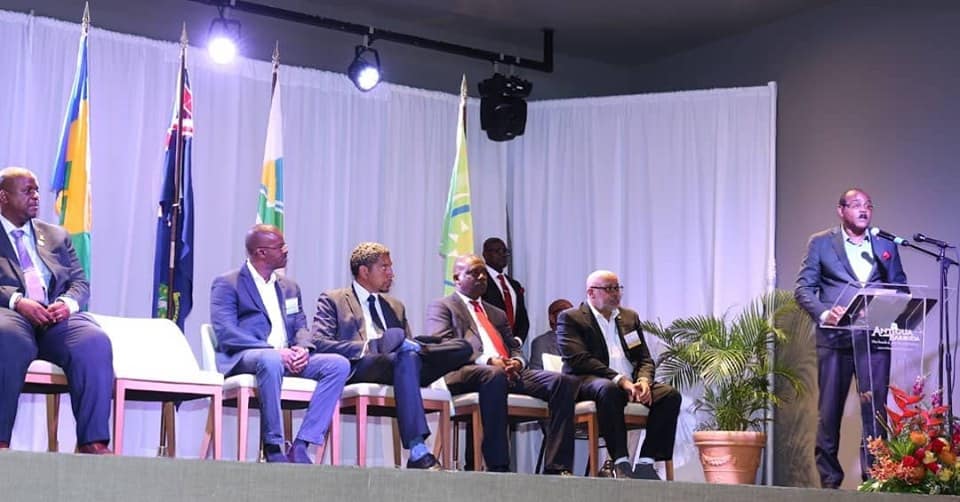
The Monetary Council of the Eastern Caribbean Central Bank (ECCB) will discuss the sale of Scotiabank in the sub-region amid suggestions that governments of the Organisation of Eastern Caribbean States (OECS) are prepared to pool their resources to acquire the branches of the financial institution up for sale.
Antigua and Barbuda Prime Minister, who is also the chairman of the nine-member OECS grouping, told a news conference that the sale of Scotiabank will be an issue that will be discussed at the next meeting of the Council. He did not indicate when that meeting will be held.

“It is an issue that we intend to raise at the Monetary Council at the next meeting…and to try and get a consensus within the OECS as to whether or not we should conjoin and purchase the branches of Scotia,” he said following the two-day meeting of the OECS leaders here.
“I would have outlined the opportunities by so doing,” he added.
Last November, the Trinidad-based Republic Financial Holdings Limited (RFHL) announced that it was seeking to acquire Scotiabank operations in several Caribbean countries.
Antigua and Barbuda and Guyana had initially expressed reservations about the proposed acquisition, with St. John’s indicating that it would not be issuing a vesting order to facilitate the move.
The RFHL statement said that the banks being acquired are located in Guyana, St. Maarten, Anguilla, Antigua and Barbuda, Dominica, Grenada, St. Kitts and Nevis, St. Lucia, and St. Vincent and the Grenadines.
It said that the purchase price is US$123 million, which represents US$25 million consideration for total shareholding of Scotiabank Anguilla Limited; and a premium of US$98 million over net asset value for operations in the remaining eight countries.
Antigua and Barbuda has said that it wants assurances that local banks will be given priority to purchase Scotiabank’s operations on the island and that local persons’ investments and savings will be protected.
Dominica’s Prime Minister Roosevelt Skerrit told reporters that “up to this moment Scotiabank has not yet gotten back to the respective governments in respect to the final approvals required for this acquisition to be consummated.
“We will have a more in-depth and focus discussion on this matter at the Monetary Council where it is better placed as opposed to the OECS Authority. But we are keen to discuss this matter.
“Obviously our interest is to ensure that in all actions taken by the various stakeholders, the governments themselves, we always want to ensure that the best interest, first and foremost of our citizens and residents are protected and therefore we would need to have a role to play in assuring that this protected at all reasonable costs,” Skerrit added.
He said he wanted to make it clear that ‘there’s “no opposition to private transactions or the free economy. It is ensuring that the interest of our citizens and the interest of our countries are assured and protected.
‘That is the fundamental responsibility of a government and one must not allow …political ramblings in our countries to set aside that very lofty responsibility,”: he said.
Last December, the ECCB, which serves as a central bank for Antigua and Barbuda, Dominica, Grenada, St. Lucia, St. Vincent and the Grenadines, St. Kitts-Nevis and Montserrat urged citizens of and residents in the Eastern Caribbean Currency Union (ECCU) to remain calm, following the announcement of the sale by Scotiabank.
In a statement, the ECCB said then that it received an application from Republic Financial Holdings, “seeking regulatory approval to acquire the Bank of Nova Scotia’s operations and businesses in the Eastern Caribbean Currency Union (ECCU),” and that it has since commenced a review of this application, pursuant to the Banking Act.
Advertise with the mоѕt vіѕіtеd nеwѕ ѕіtе іn Antigua!
We offer fully customizable and flexible digital marketing packages.
Contact us at [email protected]

















Browne knows very well that the indigenous bank don’t have the capital to force the sale he is parading about. If he continues to grand stand then I hope Scotia simply do a voluntary liquidation of the bank.
Did he have the funds to purchase WIOC? Do you understand the significance of losing this bank from our space…? and why would you HOPE the bank liquidate their assets since he is fighting for them to sell to an indigenous entity. you Antiguans really have some BAD minds among you. I think the Jamaicans call it Bad Minded People…
You are so correct. Why are some folks hell bent this man fail? You Antiguan really like to see UGLY!!
What are the assets of a bank? Cause I saw when ABIB bought Swiss American. And Gaston should know cause he used to work their. The bank assets are the loans they gave to customers backed with the monies of the depositors. Many banks don’t have real property. They may have some of their depositors’ monies invested in stocks overseas or in government bonds. That is why if their is a run on the bank they just do not have the money to pay back all their creditors. So if you are selling a bank what exactly are you selling. My loan and my deposits. A bank can only function if there is trust and security. When ABIB bought Swiss many of the Swiss customers did not trust ABIB. They therefore moved their monies to other banks. Mostly the foreign banks. ABIB had to work hard to keep some of the GOOD customers. So you suddenly have more loans than deposits, means you no need to capitalize your bank. The ratio’s are not looking good and central bank is warning you to either issue more shares or let the existing shareholders put in more money. Or find more depositors. I think Scotia bank cannot guarantee their depositors will stay and therefore cannot ask that much for their equity. WCS 40% of depositors leaves to other banks. Who will capitalize the bank than to assume all the loans. Let them come back for an earn-out after 5 or 10 years if the WCS was better to predicted. But don’t give them all the money up-front. There is too much risk in the banking sector.
Antigua news room should run an electronic poll with a few questions to see where the public views lay. Though it may not be scientific, the results cant be much way off than what Peter Wickham would have predicted or not predicted in recent times!
Comments are closed.